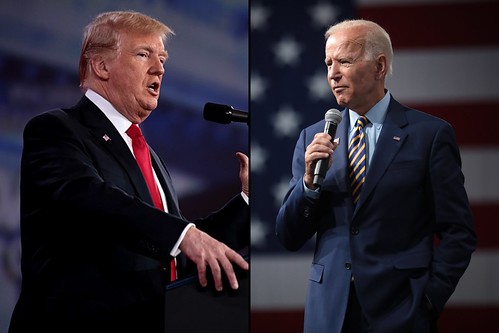If Biden becomes U.S. president and rejoins the JCPOA, Iran will get a major achievement" But if Trump is re-elected, he will continue his maximum pressure against Iran and will pose new challenges for the Iranian economy. Iranians are eagerly following the news of the U.S. election, as they expect the outcome to impact their own futures
The ultimate fate of the fragile 2015 Iran nuclear deal, known as the Joint Comprehensive Plan of Action, and the future of ties between Tehran and Washington truly hinge on the outcome of the November 3 vote.
US President Donald Trump left the nuclear agreement in tatters by abandoning it in May 2018. He imposed the "strongest sanctions ever" against Iran as part his "maximum pressure" campaign aimed at forcing Iran to make compromises on crucial issues, including its nuclear activities and its highly-touted missile program.
The feeling in Tehran is that Tump's re-election would mean the continuation of the "maximum pressure" campaign. In fact, the incumbent says if he wins the vote Iran will be forced to seek a deal "within the first month" of his second term. But as his hands are still wet with the blood of Iran's top general, Qassem Soleimani, he is not the desirable option for Iran to resume talks with.
Joe Biden's victory, on the other hand, is expected to genuinely shift US policy on Iran. In an opinion article published by CNN, Biden said if elected president he would, "offer Tehran a credible path back to diplomacy".
Biden's presidency could be a game-changer for Iran's reformists and moderate politicians who are vying for a political comeback by championing enhanced relations with the West.
"If Biden becomes U.S. president and rejoins the JCPOA, Iran will get a major achievement" But if Trump is re-elected, he will continue his maximum pressure against Iran and will pose new challenges for the Iranian economy," confirms Dr. Ahmad Naghibzadeh, Tehran University professor and a member of Executives of Construction Party, a reformist party in Iran.
Reformists, who are already under fire for their support for President Hassan Rouhani's administration, thus consider pursuing diplomacy with Biden as a more feasible way to promote their agenda.
"The new government should take advantage of the opportunities made after the U.S. elections to normalize ties with the world and tackle the sanctions". Reformists view power as a tool for entering into negotiations with the world," says Seyed Hossein Marashi, spokesman of the pro-reform Kargozaran Sazandegi Party.
However, the obvious reality is that such an attitude barely strikes a chord with the general public in Iran - geopolitical concerns have been put on the back burner after years of being a regularly-discussed topic. A majority of Iranians are instead obsessed with economy, which is cracking under sanctions and the Covid-19 pandemic outbreak.
Vote of no-confidence for Reformists
Back in 2013, Rouhani swept to a landslide, first-round victory as a centrist with a campaign of "prudence and hope". Rouhani promised to rescue the economy by ending Iran's international isolation. Seven years on, with the economy reeling from re-imposed US sanctions, those hopes have clearly been dashed. Many of his supporters are disappointed and even outraged with Rouhani's "empty" promises of change.
Rouhani's victories in the 2013 and 2017 presidential elections actually had less to do with his own popularity than with a tacit alliance with the reformists. Support from key reformist figures, including ex-President Mohammad Khatami, who had pinned hopes onto Rouhani's pro-reform pledges, played a key role.
Many voters see too big a gap between Rouhani's campaign rhetoric and the reality of his governance. Furthermore, his performance has also inflicted a heavy toll on the popularity of moderates who threw their weight behind him.
(Note: You can view every article as one long page if you sign up as an Advocate Member, or higher).






